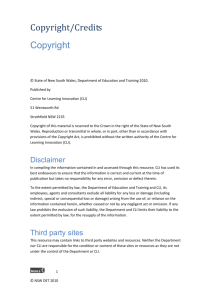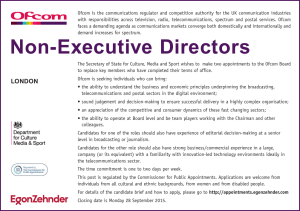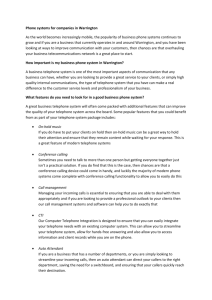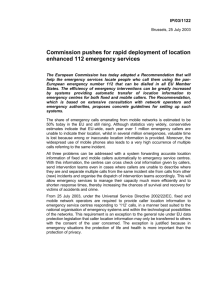Requiring direct marketing callers to provide Calling Line Identification
advertisement
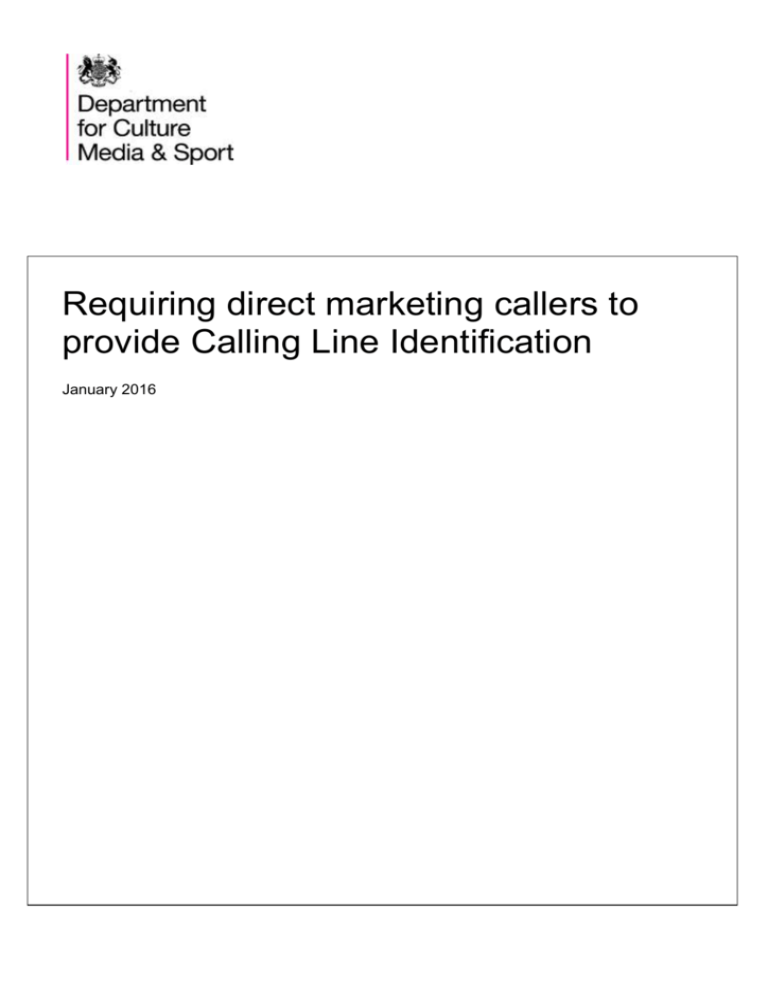
Requiring direct marketing callers to provide Calling Line Identification January 2016 3 Department for Culture, Media & Sport Requiring direct marketing callers to provide Calling Line Identification 4 Department for Culture, Media & Sport Requiring direct marketing callers to provide Calling Line Identification Contents Ministerial Foreword ....................................................................................................................................6 Introduction......................................................................................................................................................7 How to Respond...............................................................................................................................................9 Background .................................................................................................................................................... 11 What is Calling Line Identification? ..................................................................................................................... 11 What is direct marketing? ................................................................................................................................... 11 Current legislative framework ............................................................................................................................. 12 Why is it necessary to change the law?............................................................................................................... 12 Proposed change .......................................................................................................................................... 14 Legislate to require that callers making (or instigating) direct marketing calls do not withhold CLI.................. 14 What types of calls will require CLI under this proposal? ................................................................................... 14 How will the proposed requirement for direct marketing callers to provide CLI be enforced? ......................... 15 Action the ICO can take under PECR ................................................................................................................... 15 Action Ofcom can take under the Communications Act 2003 ............................................................................ 16 Impact .............................................................................................................................................................. 17 Consultation questions .............................................................................................................................. 18 6 Department for Culture, Media & Sport Requiring direct marketing callers to provide Calling Line Identification Ministerial Foreword Baroness Neville-Rolfe DBE CMG Parliamentary Under Secretary of State at DCMS and BIS and Minister for Intellectual Property. Responsible for nuisance calls policy. Unsolicited direct marketing calls can cause significant stress and anxiety, particularly to those who rely on the telephone as their main means of communication. For many, these calls are too often a source of irritation. But for some, it can lead them to fall foul of fraudsters. The activities of a minority of rogue organisations undermine the reputation of the legitimate direct marketing industry. The Government is clear that there is no silver bullet or simple solution to the problem of nuisance calls. That is why we are working closely with regulators, industry, consumer groups and parliamentarians to ensure we take coordinated and effective action to tackle this complex issue. The Government’s proposal to require direct marketing callers to provide valid Calling Line Identification, set out in this consultation paper, is part of a package of legislative and non-legislative measures to deal with the problem head on. It will both improve consumer choice, by making it easier for people to refuse and report unwanted marketing calls; and make it easier for the Information Commissioner’s Office to investigate and take enforcement action against callers who persistently and deliberately flout the rules. I believe this change will boost our efforts to protect individuals from unwanted marketing calls without adverse effects for the legitimate industry. Department for Culture, Media & Sport Requiring direct marketing callers to provide Calling Line Identification 7 Introduction 1.1 There has been a substantial rise in the number of concerns reported to the Information Commissioner’s Office (ICO) about nuisance marketing calls and texts over the past few years, with an increase of over 11 per cent in 2014/15 alone1. The Government’s Nuisance Calls Action Plan2 (published in March 2014) recognised that tackling this complex problem is a shared responsibility between Government, regulators, industry and consumer groups, requiring a multi-faceted response. The plan set out a range of legislative and non-legislative options for reform to reduce the volume of nuisance calls and the associated harm to consumers. Recent actions include: lowering the legal threshold at which the Information Commissioner may impose a monetary penalty on organisations breaching the Privacy and Electronic Communications (EC Directive) Regulations 2003 (PECR) making it easier for the ICO to more effectively share information with Ofcom in relation to nuisance calls through an amendment to the Communications Act 2003 publication of the updated Ofcom/ICO joint nuisance calls action plan in December 2015 1.2 Progress has been made. Since January 2012, the ICO has issued civil monetary penalties (CMP) totaling £2,412,000 for serious contraventions of PECR 3 . This includes a number of substantial fines amounting to £895,000 issued by the ICO since the change to the threshold in PECR that took effect in April 2015; and there are a number of others in the pipeline. Industry and regulators continue to work together to develop technical solutions to help reduce nuisance calls; and regulators are working collaboratively to share intelligence in support of effective enforcement action and to raise consumer awareness. 1.3 However, despite an increase in enforcement action, some organisations continue to breach the law; and in a significant proportion of cases the failure to provide Calling Line Identification (CLI) is making it more difficult for the ICO and Ofcom to pursue enforcement action against them. The scale of the problem is highlighted by the statistics. Of the 149,016 complaints received by the ICO about live and automated direct marketing calls in 2014, 15% didn’t provide CLI. This was further highlighted in 1 https://ico.org.uk/media/about-the-ico/documents/1431982/annual-report-2014-15.pdf 2 https://www.gov.uk/government/uploads/system/uploads/attachment_data/file/299140/Act ion_Plan.pdf 3 See Annex A for a range of Civil Monetary Penalties issued by the ICO since January 2012 Department for Culture, Media & Sport Requiring direct marketing callers to provide Calling Line Identification 8 a 2015 survey by Ofcom that found that valid CLI was recorded by consumers for just 39% of all nuisance calls (including direct marketing) received4. 1.4 The reports of the All Party Parliamentary Group5 on nuisance calls (published on 31 October 2013) 6 and of the Culture, Media and Sport Committee (published on 5 December 2013) both recommended that direct marketing calls should be required to carry CLI. During the passage of the Consumer Rights Act 2015, the Government committed at Report Stage in the House of Lords to consult on changing the law to make it mandatory for all direct marketing calls to provide CLI. 1.5 This consultation takes forward that commitment. In particular, it seeks views on the Government’s proposal to amend PECR via secondary legislation so as to require that a person does not withhold CLI when making (or instigating) direct marketing calls. 1.6 Requiring CLI7 to be provided on all direct marketing calls will: increase consumer choice, by making it easier for people to identify direct marketing calls, and choose whether to accept them; and increase the ICO’s ability to investigate such calls, by enabling consumers to provide better information with complaints and by making it easier for the ICO to take action against organisations that breach the PECR, and increase Ofcom’s ability to enforce against silent and abandoned calls. 1.7 Responses received will help us assess the need for and impacts of the proposed change. If we decide to proceed, we would look to bring the requirement into force in spring 2016. 4 http://stakeholders.ofcom.org.uk/binaries/telecoms/nuisance-calls2015/Nuisance_calls_W3_report.pdf 5 http:/www.which.co.uk/documents/pdf/all-party-parliamentary-group-on-nuisance-callsinquiry-339341.pdf 6 http:/www.publications.parliament.uk/pa/cm201314/cmselect/cmcumeds/636/63602.htm 7 see paragraph 3.2 for definition of CLI Department for Culture, Media & Sport Requiring direct marketing callers to provide Calling Line Identification 9 How to Respond 2.1 The consultation period will run for 6 weeks from 12 January 2016 to 23 February 2016. 2.2 Please respond before the closing date. The questions are set out at page 18. 2.3 Please send responses to bilal.toure@culture.gov.uk. Responses sent to any other inbox will not be taken into consideration. If you do not have access to email, please respond to: Data Protection team Department for Culture, Media & Sport, 100 Parliament Street London, SW1A 2BQ 2.4 This consultation is intended to be an entirely written exercise but we reserve the right to follow up any responses to seek further information. 2.5 Please contact the data protection team on 020 7211 6000 (or bilal.toure@culture.gov.uk) if you require any other format e.g. Braille, Large Font or Audio. 2.6 For enquiries about the handling of this consultation please contact the Department for Culture, Media & Sport Correspondence Team at the above address or email enquiries@culture.gov.uk heading your communication ‘CLI consultation’. 2.7 Copies of responses may be published after the consultation closing date on the Department’s website: www.gov.uk/government/organisations/department-forculturemedia-sport 2.8 Information provided in response to this consultation, including personal information, may be published or disclosed in accordance with access to information regimes (these are primarily the Freedom of Information Act 2000 (‘FOIA’), the Data Protection Act 1998 (‘DPA’) and the Environmental Information Regulations 2004). 2.9 If you want the information that you provide to be treated as confidential, please be aware that, under the FOIA, there is a statutory Code of Practice with which public authorities must comply and which deals, amongst other things, with obligations of confidence. In view of this, it would be helpful if you could explain to us why you regard the information you have provided as confidential. If we receive a request for disclosure of the information, we will take full account of your explanation, but we 10 Department for Culture, Media & Sport Requiring direct marketing callers to provide Calling Line Identification cannot give an assurance that confidentiality can be maintained in all circumstances. An automatic confidentiality disclaimer generated by your IT system will not, of itself, be regarded as binding on the Department. 2.10 The Department will process your personal data in accordance with the DPA, and in the majority of circumstances, this will mean that your personal data will not be disclosed to third parties. 2.11 This consultation follows the Government’s Consultation Principles (published in 2013) which are available at: https://www.gov.uk/government/publications/consultation-principlesguidance Department for Culture, Media & Sport Requiring direct marketing callers to provide Calling Line Identification 11 Background What is Calling Line Identification? 3.1 CLI is a telephone number that represents the person making a call. A CLI facility service displays a caller’s telephone number on the recipient’s handset/caller display system (where available) before the recipient accepts the call. Depending on the specifications of the handset/caller display system, the caller display facility may also provide a name that is associated with the calling number. 3.2 For a CLI to be valid it must be a number which can be used to make a return call, i.e. it has to be dialable and not malformed. It must not be a number that connects to a Premium Rate Service. 8 The user of that CLI must have the authority to use that number, either because it is a number that has been allocated to them or because the user has been given permission from a third party who has been allocated that number. What is direct marketing? 3.3 Direct marketing is “the communication (by whatever means) of any advertising or marketing material, which is directed to particular individuals” (as defined in section 11(3) of the Data Protection Act 1998 (DPA). 9 The ICO’s guidance on direct marketing10 makes clear that this definition covers not only commercial marketing but any advertising or marketing material, including material promoting the aims of notfor-profit organisations, for example, a charity or political party contacting particular individuals to appeal for funds or votes. 3.4 Genuine market research activities do not fall under this definition, however it does include selling under the guise of research (also known as “sugging”), where an organisation labels its message as a survey or research, but where the actual purpose is to sell goods or services, or to collect data for the purposes of helping it (or others) to contact people for marketing purposes at a later date. 8 There is a restriction on telemarketers from displaying these numbers, to avoid customers being changed premium rates if they call the number back. 9 http://www.legislation.gov,uk/ukpga/1998/29/section/11 10 https://ico.org.uk/media/for-organisations/documents/1555/direct-marketingguidance.pdf Department for Culture, Media & Sport Requiring direct marketing callers to provide Calling Line Identification 12 Current legislative framework 3.5 The Privacy and Electronic Communications (EC Directive) Regulations 2003 (PECR) give people specific privacy rights in relation to electronic communications. They derive from European law and implement Directive 2002/58/EC, also known as the “E-Privacy Directive”. PECR regulates calls made for marketing purposes including: unsolicited “live” direct marketing calls; and automated or recorded marketing message calls. 3.6 Under this legislation, the ICO is responsible for taking enforcement action in relation to both “live” unsolicited marketing calls and automated or recorded marketing messages. PECR prohibits the making of unsolicited ‘live’ marketing calls to a number that is registered with the Telephone Preference Service (TPS), unless the person to whom the number is allocated has previously notified the caller that he or she does not object to such calls being made on that line. All recorded marketing messages require prior consent. PECR applies to both the making and instigating of calls, and therefore can be enforced not only in relation to calls made from within the UK, but also calls made on behalf of UK companies from outside the UK. A civil monetary penalty of up to £500,000 can be issued by the ICO for companies breaching the PECR. 3.7 Abandoned and silent calls (including those which may have been intended direct marketing calls) are subject to enforcement by Ofcom using its powers to combat persistent misuse of electronic communications networks and services under sections 128 to 130 of the Communications Act 200311. The maximum penalty that can be issued by Ofcom under these provisions is £2 million. Why is it necessary to change the law? 3.8 PECR currently confers a right on any person, whether an individual or a company, to withhold their CLI when making a call. The ability to withhold CLI remains generally important to privacy and is of critical importance in relation to vulnerable callers, for example, victims of domestic violence or abuse. However, it is clear from the high proportion of marketing calls made with no CLI provided, as evidenced by the ICO and Ofcom complaints and research data set out above, that some direct marketing callers are abusing this right to make unsolicited calls to consumers without providing CLI. 11 http://www.legislation.gov.uk/ukpga/2003/21/section/128 Department for Culture, Media & Sport Requiring direct marketing callers to provide Calling Line Identification 13 3.9 To address this, regulators and industry have been working together to encourage the take up of CLI by direct marketing callers and to improve call tracing procedures. Measures include: Industry-led voluntary agreements: The Direct Marketing Association’s code of practice requires all outbound marketing calls to include CLI12. Ofcom’s statutory statement of policy on persistent misuse of electronic networks or services: this policy states that callers using automated diallers to make calls (including predictive diallers) should provide CLI to help reduce the harm caused by silent and abandoned calls.13 Improvements in call tracing: Following a successful trial in February 2014, Ofcom agreed a new standardised approach to call tracing across and between network providers in the UK and abroad. This has been implemented and is in routine use by the ICO and Ofcom. In addition, Ofcom is working with the telecommunications industry to make it more difficult for callers to use Voice over Internet Protocol (VoIP) to facilitate the use of invalid CLI. VoIP enables users to make free phone calls through internet services. However, significant changes are needed worldwide for this to become effective and tangible progress is unlikely before 2020, as this will need to include agreements between overseas telecommunications service providers14. Ofcom are reviewing their CLI Guidelines: This document sets out how CLI information is carried through different networks, which may use different technologies, and how it is presented to consumers. Its aim is to improve the consistency of CLI information presented to consumers, whilst also protecting the associated privacy rights. 3.10 Whilst these initiatives are very welcome and make an important contribution to tackling the problem of nuisance calls, it is clear that in a significant number of 15 complaints reported to the regulators, CLI is still not being provided. The Government believes that by changing the law to require all direct marketing callers to provide CLI, we will create a more effective underpinning to the range of industry initiatives and technical solutions that are being developed in this space. 12 http://dma.org.uk/uploads/Interactive_code_v29(24%20June)ii_53e0ecac59009.pdf (paragraph 2.2) 13 Ofcom has recently reviewed its statement of policy and is consulting on changes to it. The consultation is available at http://stakeholders.acmpub.intra.ofcom.local/consultations/review-of-how-we-usepersistent-misuse-powers/ and closes on 10 February 2016 14 http://www.ofcom.org.uk/content/about/annual-reports-plans/annplans/Annual_Plan_Statement.pdf (paragraph A2.32) 15 see paragraph 1.3 of introduction. 14 Department for Culture, Media & Sport Requiring direct marketing callers to provide Calling Line Identification Proposed change Legislate to require that callers making (or instigating) direct marketing calls do not withhold CLI 4.1 The Government proposes to amend PECR, via secondary legislation, to require that callers making (or instigating) direct marketing calls do not withhold CLI. The main benefits of the proposal are two-fold: it will increase consumer choice, by making it easier for people to identify direct marketing calls, and choose whether to accept them; and it will increase the ICO and Ofcom’s ability to investigate such calls, by enabling consumers to provide better information with complaints and by making it easier for the ICO and Ofcom to take action against organisations that breach the PECR and the Communications Act 2003 respectively. 4.2 The requirement would apply to all individuals and organisations making calls for the purposes of direct marketing (as defined in section 11(3) of the DPA and described in greater detail at paragraphs 4.1). What types of calls will require CLI under this proposal? 4.3 The proposal will apply to all individuals and organisations making (or instigating) calls for the purposes of direct marketing (as defined in paragraph 3.3). It will apply to both ‘live’ and ‘automated’ direct marketing calls (as defined in PECR), and will capture these calls even if they result in silent or abandoned calls (for example, because no agents were available to handle the call when the recipient answered the telephone). 4.4 The right under PECR for callers to withhold their number and retain privacy will continue to apply to all other types of non-marketing calls. Telephone calls made from a doctor’s surgery, local health clinic or hospital, for example, will continue to have the right to call from a private withheld number. However, should such organisations make direct marketing calls, they will have to provide CLI when doing so. Department for Culture, Media & Sport Requiring direct marketing callers to provide Calling Line Identification 15 A single point of contact for reporting direct marketing calls that do not carry CLI 4.5 The ICO and Ofcom have agreed that the ICO should act as a single point of contact for consumers to report direct marketing calls that do not provide CLI. This means that all calls (live and automated) should be reported to the ICO by telephone or online in the first instance. 4.6. A letter of understanding already in place between Ofcom and the ICO16 sets out the principles for collaboration between the two regulators in areas where they share common enforcement responsibility in relation to PECR, which include the use of automated calling systems, the transmission of recorded messages that contain direct marketing material, and compliance with the Telephone Preference Service and other similar services. As is the case under the existing agreement, the ICO and Ofcom will decide which organisation is best placed to investigate issues of non-compliance in relation to non or invalid use of CLI; and where it is more appropriate for Ofcom to investigate using its persistent misuse powers under the Communications Act 2003 in relation to silent or abandoned calls, the ICO will pass on the relevant information to enable enforcement action. How will the proposed requirement for direct marketing callers to provide CLI be enforced? 4.7 The ICO and Ofcom will use their existing powers, in PECR and the Communications Act 2003 respectively, to enforce the proposed requirement for direct marketing callers to provide CLI. Action the ICO can take under PECR 4.8 The proposed requirement will mean that failure by direct marketing callers to provide CLI will constitute a breach of PECR. It will be a matter for the ICO to determine the appropriate enforcement action to take based on the seriousness of the contravention and other aggravating and mitigating factors. 4.9 It is possible that failure to provide CLI by an organisation or individual making live or automated direct marketing calls (without evidence of a wider breach of PECR) may be sufficient to amount to a ‘serious’ contravention of PECR, as defined in ICO’s statutory guidance on Civil Monetary Penalties (CMP) 17 and could therefore result in a monetary penalty. Evidence of multiple breaches or systematic non-compliance will 16 http://www.ofcom.org.uk/about/policies-and-guidelines/data-protection/letter-ofunderstanding-between-ofcom-and-ico/ 17 https://ico.org.uk/media/for-organisations/documents/1043720/ico-guidance-onmonetary-penalties.pdf 16 Department for Culture, Media & Sport Requiring direct marketing callers to provide Calling Line Identification be more likely to amount to a serious contravention of the PECR. However, it will be a matter for the ICO’s determination, having regard to the circumstances of each case. 4.10 In addition to CMPs, the ICO has a number of other tools available for taking action to change the behaviour of organisations and individuals who breach PECR (but which is considered to fall short of a ‘serious’ contravention) including audits to check organisations are complying with the regulations and enforcement notices where there has been a breach, requiring an organisation to take specified steps to comply with the law. Action Ofcom can take under the Communications Act 2003 4.11 Ofcom uses its powers under sections 128 to 130 of the Communications Act 2003 to enforce against “persistent misuse” of electronic communications networks or services. It will continue to exercise its powers to investigate silent or abandoned calls (and which may have been intended to be direct marketing calls). As set out above, Ofcom’s statutory statement of policy on persistent misuse states that callers using automated diallers should provide CLI to reduce the harm caused by silent and abandoned calls. In addition, the statement of policy explains that the repeated forwarding of inauthentic or misleading CLI information will be regarded as persistent misuse, and is liable to enforcement action. Ofcom also notes in its consultation on proposed changes to that policy that if the law were to change to require direct marketing calls to provide CLI, it may also consider the withholding of CLIs to be persistent misuse. 4.12 If during the course of its investigations, Ofcom finds that the caller’s conduct could amount to both persistent misuse (for example, by making silent and abandoned calls in accordance with section 128 of the Communications Act 2003) and also a breach of PECR (because the calls were intended to be direct marketing calls and the caller did not present CLI), either Ofcom or the ICO could take action where their enforcement roles overlap. Ofcom have the power to issue a CMP of up to £2m under the persistent misuse provisions. How will the change be achieved? 4.13 The Government proposes to amend PECR, via secondary legislation, using powers in the European Communities Act 1972 to require that a person does not withhold CLI when making (or instigating) direct marketing calls. This amendment would restrict the scope of the privacy rights in Article 8 of the E-Privacy Directive. Such a restriction is permitted pursuant to Article 15 where it is a necessary, appropriate and proportionate measure to prevent, detect and investigate the unauthorised use of electronic communications systems. We believe the proposed change is proportionate as it is limited in scope only to calls made for direct marketing purposes, will have minimal impacts on legitimate marketing organisations, and will increase the ICO’s ability to investigate unsolicited marketing calls and to take action against organisations that breach the PECR. Department for Culture, Media & Sport Requiring direct marketing callers to provide Calling Line Identification 17 Impact 5.1 The Government estimates that there are approximately 2,000 organisations in scope of the proposed regulation (based on membership figures of the Direct Marketing Association (DMA). Around half of these already provide CLI and so would be unaffected. The DMA suggests that complying with the proposal would be relatively straightforward. Organisations would either need to change the settings of predictive diallers or contact their equipment supplier, or make a request to the telephone provider. 5.2 The Department estimates that the one-off cost of the proposal would total approximately £12,00018, based on one hour’s time for each of the 1,000 affected organisations at an hourly rate of £12 (inclusive of non-wage labour costs). This estimate does not however include any potential technological or engineering costs that might be involved in the requirement to change telephone settings and we would therefore welcome any evidence in this respect as part of the consultation. 5.3 There may be a small reduction in revenue for direct marketing organisations as consumers may be less likely to answer calls when it is possible to identify the source. This effect is difficult to quantify, but we estimate it to be relatively small as the DMA has said that few legitimate organisations or individuals would lose revenue as a consequence of having to provide CLI for outbound marketing calls. 5.4 The measure may also lead to some increased enforcement costs for the ICO, as it is likely that it will encourage an increased number of complaints and investigations. However, the ICO has provided assurances that the increased costs can be absorbed within its existing resources. 5.5 A Regulatory Triage Assessment (RTA) has been undertaken to take account of any unnecessary burdens that may be placed upon businesses. 18 This figure has been rounded to the nearest hundred. 18 Department for Culture, Media & Sport Requiring direct marketing callers to provide Calling Line Identification Consultation questions Do you agree that the Government should amend PECR to make it a requirement for direct marketing callers to provide CLI? Are there any other costs or benefits that may be associated with this proposal that you think the Government should consider before taking a final decision? Department for Culture, Media & Sport Requiring direct marketing callers to provide Calling Line Identification 19 Annex A Civil Monetary Penalties issued by the ICO since January 2012 (not under appeal) Date Company Issue Penalty 19 November 2015 Nuisance Call Blocker Ltd Organisation making unsolicited calls to sell products to reduce the amount of unwanted calls £90,000 19 November 2015 Telecom Protection Service Ltd Organisations making unsolicited calls to sell products to reduce the amount of unwanted calls £80,000 17 November 2015 UKMS Money Solutions Ltd PPI claims company made unsolicited calls to TPS registered consumers £80,000 05 November 2015 Oxygen Ltd Lead generation company made unsolicited SMS text messages £120,000 21 October 2015 Help Direct Limited Lead generation company made unsolicited calls to sell products to reduce the amount of unwanted calls £75,000 14 September 2015 Cold Call Elimination Ltd Organisation making unsolicited calls to sell products to reduce the amount of unwanted calls £75,000 05 May 2015 Point One Marketing Ltd formerly Conservo Digital Organisation making unsolicited calls to sell products to reduce the amount of unwanted calls £50,000 01 April 2015 Direct Assist Claims management company £80, 000 made direct marketing calls without consent 18 December 2014 Kwik Fix Plumbers Ltd previously t/a Boiler Shield Boiler insurance. Made unsolicited calls to TPS registered consumers. £90,000 29 September 2014 EMCAS Claims management company. Made unsolicited calls to TPS registered consumers. £70,000 03 April 2014 Amber UPVC Fabrication Ltd Making calls to TPS registered consumers £50,000 Department for Culture, Media & Sport Requiring direct marketing callers to provide Calling Line Identification 20 08 July 2013 18 June 2013 Tameside Energy Services Ltd (Manchester) Energy efficiency improvements company. Nationwide Energy Services Both companies were part of Save Britain Ltd based in Swansea and were liquidated before any appeal. The penalties stand, but cannot be collected. We Claim You Gain £45,000 Failed to carry out adequate checks on TPS registration. £125,000 £100,000 Failed to make adequate checks whether recipients were TPS registered. 18 Mar 2012 DM Bedroom Designs Ltd Glasgow Manufactures, fitment and sellers of kitchens, bathrooms and bedrooms. Made unsolicited calls to TPS registered consumers. £90,000 21 Department for Culture, Media & Sport Requiring direct marketing callers to provide Calling Line Identification
